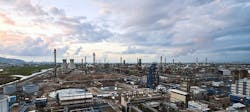Israeli integrated refiner to produce renewable olefins, polyolefins
Bazan Ltd. is progressing with work to produce polypropylene and polyethylene from renewable feedstock at the company’s integrated refining and petrochemical operations in the Haifa Bay area of northern Israel along the eastern Mediterranean Sea.
Having successfully completed preparations for its green polymers strategy, Bazan’s Oil Refineries Ltd. (ORL) and ORL subsidiary Carmel Olefins Ltd. have received ISCC System GmbH’s International Sustainability Carbon Certification (ISCC) to produce green polypropylene and polyethylene at the adjacent ORL refinery and adjacent COL petrochemical complex, Bazan said in a Mar. 5 post to its official LinkedIn account.
The ISCC certification—which includes the ISCC European Union (EU) and ISCC Carbon Offsetting and Reduction Scheme for International Aviation (CORSIA) PLUS co-processing certifications—will allow the ORL refinery to incorporate the conversion of used cooking oil (UCO) into green ethylene and propylene that COL plants will subsequently polymerize into bio-circular polyethylene and polypropylene, the company said.
Alongside leveraging synergies between the nearby manufacturing sites, the green polymer production process will enable ORL to reduce its reliance on crude oil feedstock while allowing COL to convert biological waste into a usable feedstock for production of environmentally friendly plastics, Bazan said.
While Bazan did not reveal details regarding a timeline or proposed capacities for production of the green monomers and polymers, the project comes as part of the operator’s strategy to meet growing demand for polymers produced from recycled and biodegradable materials along the company’s broader journey to supporting the transition to a low-carbon economy, according to Bazan’s latest sustainability report for investors.
Bazan said it plans for green polymers to make up 15% and 30%, respectively, of its total polymer sales by 2025 and 2030.
At the ORL refinery—which has a combined distillation and vacuum crude processing capacity of about 197,000 b/d—Bazan told investors it is also implementing new technologies to enable production of sustainable aviation fuel (SAF) from hydrogen, as well as developing production of renewable diesel based on a feedstock of UCO.
Further details of the proposed SAF and renewable diesel projects, however, have yet to be disclosed.
According to Bazan’s website, COL’s operations in the Haifa Bay industrial zone house three main clusters of integrated production plants:
- A monomer plants cluster, which includes a steam cracker receiving naphtha and LPG from the ORL refinery as feedstock to produce 240,000 tonnes/year (tpy) of ethylene and 135,000 tpy of propylene, as well as a metathesis plant that produces an additional 180,000 tpy of propylene.
- A four-line polyethylene plants cluster with a total production capacity of 180,000 tpy of low-density polyethylene.
- A two-line polypropylene plants cluster with a total production capacity of 400,000 tpy.
About the Author
Robert Brelsford
Downstream Editor
Robert Brelsford joined Oil & Gas Journal in October 2013 as downstream technology editor after 8 years as a crude oil price and news reporter on spot crude transactions at the US Gulf Coast, West Coast, Canadian, and Latin American markets. He holds a BA (2000) in English from Rice University and an MS (2003) in education and social policy from Northwestern University.

